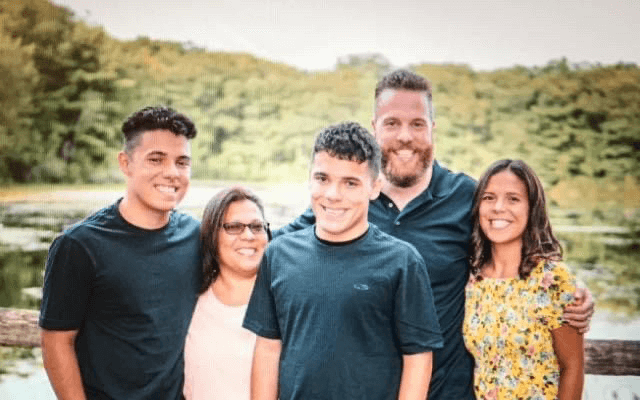February 25, 2026
A Special Mother’s Day Interview with Becky Schoenfeldt

Becky Schoenfeldt, a registered behavior technician (RBT) for LEARN’s Behavioral Concepts (BCI) clinic in Worcester, Massachusetts, spends her days helping kids with autism attain goals on their behavioral health treatment plans. At the end of the day, she goes home to do more of the same, only this time with her 18-year-old son, Dougie, who was diagnosed with autism at age three and needs round-the-clock care.
In a recent interview, Becky talked about her journey with autism, the pitfalls and triumphs along the way, and the lessons learned as both a parent and practitioner in the field. In honor of Mother’s Day, she gives advice to other moms—and all parents and caregivers of kids with autism—about the challenges and rewards.
Q: Let’s start from the beginning, Becky. You were working as a case worker for the Housing Authority, helping families from homeless shelters find work and become self-sufficient, when you noticed developmental delays in Dougie. Tell us about that time period.
A: That’s right. At the time, I spent my days—and nights—helping families get back on their feet after setbacks. I also worked for the Department of Youth Services, the juvenile justice agency in Massachusetts that serves kids and teens who were arrested or charged with an offense. The work wasn’t easy and required late shifts. When I became a parent, I knew I couldn’t keep working there because of safety issues related to the challenging behaviors of some of the kids. I had three little children close in age—technically, Irish triplets. Dougie and Stevie, my twins, have a sister Alli who is only 11 months older. I had my hands full.
Stevie and Alli are neurotypical, so I noticed certain things were different with Dougie. Instead of crawling, he would scoot on his butt. He wouldn’t respond to his name or loud noises. We would bang pots and pans and get no response. He also didn’t make eye contact or speak. But he was sweet and adorable. Once he started walking, he would take us quietly by the hand and lead us along. He was a happy boy.
Often, I brought up my concerns to family and friends, and they would say, “Don’t worry—he’ll eat [or walk or talk] when he’s ready.” The pediatrician kept saying, too, that twins do things at their own speed, that I shouldn’t worry. But I knew in my heart something wasn’t right.
Q: What was it like getting the diagnosis?
 A: We were prepared and knew it was coming, but it still felt like a kick in the gut to hear those words. I worried about his future, his present—everything. And then I realized: parents of newly diagnosed kids can either wallow in self-pity or start supporting their child so he or she can live the best life possible. That’s what we did—we were proactive and started supporting Dougie.
A: We were prepared and knew it was coming, but it still felt like a kick in the gut to hear those words. I worried about his future, his present—everything. And then I realized: parents of newly diagnosed kids can either wallow in self-pity or start supporting their child so he or she can live the best life possible. That’s what we did—we were proactive and started supporting Dougie.
We lived in Connecticut at the time and enrolled Dougie in preschool, thinking it would be a good opportunity. When I picked him up from school one day, they told me he had eaten rocks—as though that was normal behavior for a child. “What do you mean, he ate rocks?” I asked them. They said it wasn’t so unusual, but I didn’t believe them. I worried about his safety.
We decided to move to Massachusetts, where my mother-in-law worked as a teacher in a local school district. We had high hopes for Doug’s first school in Massachusetts but came to realize our son needed more support than the school could provide, despite their best intentions. Sometime after kindergarten, Dougie spotted a red jeep in the parking lot that looked like his grandmother’s car. Thinking it was, in fact, his grandmother’s car, he bolted out the door, somehow getting past several staff members—six of them, I was told. How could a kid bolt past six staff members? Why couldn’t they protect my son?
For a long time, Dougie has had an issue with bolting. Even today, if he sees something as ordinary as a squirrel across the street or a holiday decoration nearby, he might take off. He doesn’t have the safety skills.
Q: Did you end up keeping Dougie at that particular school? What was your relationship like with the school staff?
A: We realized the regular public school wasn’t right for him. They wouldn’t allow him to use noise cancellation headphones or other coping mechanisms, like a weighted scarf or blanket. Their attitude seemed to be: if you can’t change the environment, you change the kid. But it was more the environment that needed changing, with so many noises and the constant bells ringing and beeping, the harsh lights, smells, and crowds. These things really bother kids on the spectrum.
We tried to get Dougie placed out of the school and put into a more supportive set up, but that would have cost the school district money they didn’t want to pay. Plus, they would have had to admit that they couldn’t manage Dougie, which they didn’t want to do. So, it was an all-round bad situation.
Growing up, Dougie had severe self-injurious behaviors (SIBs) like head-banging or hitting his head. He often did this on the school bus, and the bus monitors weren’t trained to handle it. I had to leave work several times to pick up Dougie from school, especially in 6th grade—that year was horrible. But the school principal was great, and knew we needed something different. We ended up hiring a lawyer to help us get the school district to “outplace” Dougie, meaning they paid for him to attend another school. It worked, and that was the best $350 we ever spent.
Q: That sounds like an incredibly rough year. What happened next? How did you get Dougie the help he needed?
A: Around the time, I had retrained in my career and worked as a behavior technician for BCI. It was stressful because I kept having to call out of work to take care of Dougie. I finally went to Dr. Robinson, the founder, and asked if Dougie could get a spot in a social skills group at BCI. We worked out an arrangement, and Dougie started ABA therapy.
Eventually, with the help of Dr. Robinson and the lawyer, we secured a spot for Dougie at a school for kids with autism, the Center for Applied Behavioral Instruction (CABI), in Worcester, and that has made all the difference. He has one-to-one attention, a highly-structured routine, and only six or so students in the classroom. He’s a happy kid now—a completely different kid now. He’s doing geometry. He works as a cashier in the school store. Best of all, he actually seeks interaction and even physical contact, like a hug, from people he trusts.
He also discovered he likes art. Just like his dad, Dougie is a talented artist. He loves to draw on whiteboards, and loves to draw Sonic characters.
 Q: CABI seems like a great place. Have you thought about life after CABI? How long can Dougie stay there?
Q: CABI seems like a great place. Have you thought about life after CABI? How long can Dougie stay there?
He can stay at CABI for four more years, until he ages out at 22. It’s gone by so fast. My husband and I both have to work, and we’re not sure what we’re going to do. We’re looking at day programs because Dougie will still need structure. But I want him to do more than bag groceries at Shaw’s. I hope he can find a job and do something related to art, something he’s passionate about, though I wonder how he can hold down a job if there’s a loud noise, like a baby crying. He would need an understanding, supportive work environment.
I worry about Dougie getting older—and me getting older. I don’t want him to end up in a residential program. For many people who work at those facilities, it’s just a babysitting job. But it’s far more than a job. It’s someone’s life you’re molding.
Q: Yes, it’s an opportunity to really influence and mold, as you say, an individual’s character—a person’s whole life, really. What has it been like for you, as a mom and an RBT?
A: Helping kids and families with autism is who I am and what I do. I’ve finally found something I enjoy, and it’s nice working with families. I never dread going to work because when I open that door, I know I’m a positive reinforcer. The other week, one of my kids fell asleep during a session, so we had to reschedule. Then I didn’t see her the next week because of Dougie’s spring break. When I finally got to see her, she gave me an enormous hug. That’s pretty rewarding.
When we had to go full remote with COVID, life was a rollercoaster. Dougie adjusted well because I set up his environment and work area similarly to school, with his visuals and sensory objects in place. We followed his treatment plan and kept making progress.
Q: What advice do you have for other moms or caregivers raising kids with autism?
A: I see a lot of single-parent families, mostly where it’s just the mother. That’s not easy, especially if there are other kids in the family she has to care for. When parents have their own personal problems they’re dealing with, that can make it difficult to support the goals of therapy at home. But that part of therapy is so critical—learning has to continue in the home environment.
The advice I can give other moms and parents is to build your support network. It might take work, but the effort is worth it. Also remember that no challenge is too big, and no victory too small. I like a challenge and decided to rise to the challenge of raising Dougie and two other kids, while helping kids in my job. It’s not easy, but it’s my life, and I wouldn’t trade it for anything.
Q: With your busy schedule, how do you practice the important art of self-care? What will you do for fun this Mother’s Day?
A: For self-care, I make every moment count, even when I’m at the grocery store. Sometimes, I just enjoy the quiet of walking down an aisle alone, getting to think or move at a slower pace for a moment. This summer, I’ll go to the zoo and water park with my family. We’ll get outdoors and do some of the things we couldn’t do last summer because of COVID.
On Mother’s Day, I’ll be with my family, but the weekend before, my daughter, Alli, will be home from college—she goes to Roger Williams University in Rhode Island. On Sunday, I’m taking the two of us to get our nails done. It’s an early Mother’s Day present before she has to go back to school.





